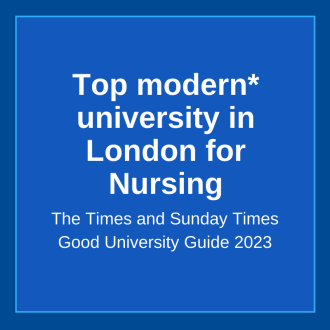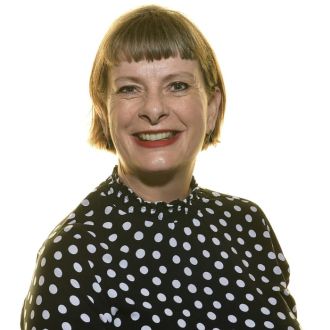- Postgraduate
Clinical Practice MSc
Overview
This clinically-focused course is designed to support healthcare practitioners who have recently qualified and need to develop the knowledge and skills to work effectively in their chosen specialism. It can also support established practitioners who would like to extend their skill set within a new specialism.
It allows you to gain a postgraduate award as recognition of your continued learning and development. You can choose to qualify with these awards:
- PgCert - part-time for one year (up to two years maximum)
- PgDip - part-time for two years (up to three years maximum)
- MSc - part-time for three years (up to four years maximum).
You can choose between a generic award in clinical practice or a specialised award in a particular area. Your course leader will help you to decide which route is most suitable for your clinical needs.
Throughout your course, you will benefit from our links with Healthcare providers. These links help us to offer a wide range of excellent facilities that support teaching and learning activity.
This course is based in London but we also offer MSc Clinical Practice based in Reading.

Select your desired study option, then pick a start date to see relevant course information:
Start date:
If your desired start date is not available, try selecting a different study option.
Why study Clinical Practice with us?


What our students say…
The lecturers are fantastic and I don't think I would get as many work experience opportunities at any other university.




Course detail & modules
This flexible Masters course in clinical practice is based at our West London campus but we also offer MSc Clinical Practice based in Reading.
Teaching staff
You will learn from highly skilled staff, many of whom are conducting research in their specialist areas, ensuring that your studies are both challenging and rewarding. Your learning will take place in a wide range of settings and you will work with a variety of people, including patients, clients and expert clinicians and lecturers.
PgCert, PgDip and MSc awards
See below for the module requirements for each award:
- for PgCert there are no compulsory modules. You can select from the optional modules available
- for PgDip you need 20 credits from the compulsory modules below, out of a total of 120 credits
- for MSc you need 80 credits from the compulsory modules below, out of a total of 180 credits.
Optional modules will run subject to staff availability and a viable number of students opting to take the module.
Generic or specialist award?
The course allows you to choose from a range of optional modules to suit your clinical needs.
You can choose to qualify with a generic award in clinical practice or to focus your learning on one of the specialisms below:
- Independent and Supplementary Prescribing
- Acute Care
- Intensive Care
- Critical Care
- Care of the Older Person
- Out of Hospital Care
- Midwifery
- Mental Health
- Psychosocial Interventions
- Urgent Care
- Opthalmic Care
- Addiction Studies
Each module has a credit value, depending on the number of hours of study it involves. To qualify with MSc Clinical Practice in one of the specialised fields above, you need to obtain a minimum of 40 credits at Level 7 from optional modules in your chosen field. Your final core module (see module list) also needs to reflect your specialism.
The transition to postgraduate study
You have the option of starting your postgraduate studies with a Level 6 module (equivalent to the final year of undergraduate study) to help you refresh and develop your academic writing skills, up to a maximum of 20 credits. The rest of your modules must be drawn from Level 7 (postgraduate). If you choose a Level 6 module then you cannot take a module with the same focus at Level 7.
If you are studying for an MSc Clinical Practice then you must study two compulsory modules aimed at enabling your use of evidence to support your practice. You can choose between two routes, both of which start with a 20 credit introductory module followed by a final 60 credit module.
Either:
- Evidence Based Implementation of Improvement Methods
- Improvement Project
Or:
- Systematic Review: Principles and Methods
- Systematic Review of Evidence to Inform Professional Practice.
You also need 100 credits from optional modules.
Compulsory modules
-
Evidence Based Implementation of Improvement methods
-
Improvement Project
-
Systematic Reviews: Principles and Methods
The National Institute for Health Research (2019) describes a systematic review as: ‘Evidence-based healthcare relies on the availability of the best evidence upon which patient-centred clinical decisions can be made. Reviews make a significant contribution to this by attempting to identify the totality of evidence available, appraising and then summarising this evidence.’
This module will explore the principles and methods of undertaking a systematic review.
-
Project - Systematic Review of Evidence to inform Professional Practice L7
Entry requirements
You should:
- be registered with a UK professional body (Health and Care Professions Council or Nursing and Midwifery Council)
- hold a degree (eg BA, BSc, BNursing)
- be based in the UK
For the ‘Independent and Supplementary Prescribing’ module, you must have access to a designated medical practitioner within your organisation, who will contribute to the Structured Clinical Examination in Practice summative assessment.
Mature applicants
If you don't have a degree but you have a Diploma in Higher Education and relevant professional experience, we encourage you to apply. Your application will be considered on an individual basis and you will be asked to demonstrate your experience through a portfolio of work.
More about accrediting previous learning
Entry criteria for specialist awards
If you want to work towards one of the specialist awards listed above then you must be working in that specific area of health or social care provision. We will ask you to confirm this when you apply.
If you are from the European Economic Area (EEA) and you do not have the equivalent of GCSE English Language at grade 4 or above, you will need either:
- An overall IELTS (International English Language Testing System) of 7.0 with a minimum of 6.5 for Writing, Speaking, Reading and Listening, OR
- OET (Occupational English Test) B grade in Writing, Speaking, Reading and Listening (we can only accept results of tests taken from Feb 2016 onwards), OR
- TOEFL (Test of English as a Foreign Language) Internet Based Test with a minimum score of 100/120
- Visit our English language requirements page for information on other English language tests we accept.
You must also meet the requirements for UK students.
Mature applicants
If you don't have a degree but you have a Diploma in Higher Education and relevant professional experience, we encourage you to apply. Your application will be considered on an individual basis and you will be asked to demonstrate your experience through a portfolio of work.
More about accrediting previous learning
Entry criteria for specialist awards
If you want to work towards one of the specialist awards listed above then you must be working in that specific area of health or social care provision. We will ask you to confirm this when you apply.
Fees & funding
To study this course, you may be funded by your employer or you may need to fund your own studies.
For full information on fees and funding please contact catherine.lynch@uwl.ac.uk
Funding your studies
You may be eligible for a student loan to cover the cost of tuition fees, or a maintenance loan.
We help keep your costs down by offering free transport between our London campuses. Our Student Services teams can also offer advice on managing student finances, working while you study, and more. View full details, including conditions and eligibility.
To study this course, you may be funded by your employer or you may need to fund your own studies.
For full information on fees and funding please contact catherine.lynch@uwl.ac.uk
Funding your studies
You must be classified as a UK student before starting this course.
Visit the UK Council for International Student Affairs (UKCISA) website for information about whether you qualify as a UK student or as an International student.
Teaching staff

Dr Catherine Lynch
I have been leading various iterations of the Masters in Advanced Practice since 2009 at UWL, taking revised versions of the program through successful validation/revalidation ever 4 years. In addition, I led on the accreditation of the MSc Advanced Clinical Practice programme with Health Education England in 2020. I am passionate about empowering healthcare practitioners with the soft skills to make a different in their practice and cite the discovery of emotional intelligence and transactional analysis amongst my highlights in academia. During the pandemic, I became a proficient user of graphic design software, predominantly using Canva and Adobe Creative Cloud, which I believe gives my students an immersive and entertaining, quality learning experience.
I have been leading various iterations of the Masters in Advanced Practice since 2009 at UWL, taking revised versions of the program through successful validation/revalidation ever 4 years. In addition, I led on the accreditation of the MSc Advanced Clinical Practice programme with Health Education England in 2020. I am passionate about empowering healthcare practitioners with the soft skills to make a different in their practice and cite the discovery of emotional intelligence and transactional analysis amongst my highlights in academia. During the pandemic, I became a proficient user of graphic design software, predominantly using Canva and Adobe Creative Cloud, which I believe gives my students an immersive and entertaining, quality learning experience.
Study & career progression

On graduation, the clinical and research skills you will have developed, as well as your ability to self-manage and solve problems, could help you to gain promotion in your chosen field.
You could also choose to further your research interests with a PhD or Professional Doctorate.
In addition, you can view our Continuing Professional Development (CPD) courses for more options.
How to apply

You can apply online at any time by following the link below.
Our application form will ask you for some information about:
- what you want to study
- your previous qualifications or experience
- your references
- how we can contact you.
Want to ask us a question first? We would love to hear from you. Contact us free on:
- 0800 036 8888
- courses@uwl.ac.uk
Apply for this course
Next steps after making your application
We aim to make a decision on your application as quickly as we can. If we need any more information about your qualifications, we will be in touch.
In the meantime, come and visit us and find out more about what studying at UWL is like. Sign up for an open day or join a campus tour.
Visit us and see for yourself
Talk to our tutors and find out about our courses and facilities at our next open day or join a campus tour.
We're here to help
Any questions about a course or studying at UWL? We're here to help - call us on 0800 036 8888 (option 2, Monday – Friday 10am-4pm) or email us on courses@uwl.ac.uk.
Our postgraduate prospectus
All of our courses in one place - download now or order a hard copy.
Search for courses
Student life at UWL
Important notes for applicants
Disclaimer
*Modern universities - defined as higher education institutions that were granted university status in, and subsequent to, 1992.
**The National Student Survey 2023 and 2024 - Average of answers to all questions by registered student population. Excludes specialist institutions.
Testimonials - our students or former students provided all of our testimonials - often a student from the course but sometimes another student. For example, the testimonial often comes from another UWL student when the course is new.
Optional modules - where optional modules are offered they will run subject to staff availability and viable student numbers opting to take the module.
Videos - all videos on our course pages were accurate at the time of filming. In some cases a new Course Leader has joined the University since the video was filmed.
Availability of placements - if you choose a course with placement/internship route we would like to advise you that if a placement/internship opportunity does not arise when you are expected to undertake the placement then the University will automatically transfer you to the non-internship route, this is to ensure you are still successful in being awarded a degree.











